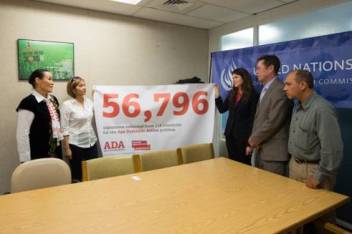I attended the third session of the UN Open-ended Working Group on Ageing in New York from 21-24 August. It was my first experience attending such an international level meeting and I was very impressed with the atmosphere.
Challenge the attitude towards older people’s rights
Delegations from member states and civil society organisations of different countries were present to discuss gaps in the protection of older people’s rights and how to address them. Unfortunately, only 35 % of member states attended the OEWG. This shows that older people’s issues are not a priority in these countries, and we must work hard to change and challenge this.
Presenting the ADA petition
We also had Kulumkan Shabdanbekova, a civil society representative, ADA activist and older woman from rural Kyrgyzstan present. Kulumkan presented our Age Demands Action petition to Ivan Simonovic, the UN Assistant Secretary-general for Human Rights.
The petition has been signed by more than 56, 000 people and calls for a convention on older people’s rights. While handing the petition, Kulumkan said, “Older people’s rights should be fully protected under international and national legislation, and that they should be included in development programmes as citizens with equal rights.” She also stressed that it is essential for older people to participate in decision making at all levels.
Ivan Simonovic graciously accepted the petition recognising the importance of older people’s rights. He said that the issue of global ageing is of utmost importance and needs to be considered at the UN level.
Sharing examples of national legislations
I was also interested in the panel discussions that were organized around five areas including age discrimination; violence and abuse; autonomy; independent living and healthcare; social security and access to resources, as well as access to justice. Kulumkan and I contributed to the discussion on access to social security and violence and abuse. We shared examples from Kyrgyzstan where the national legislation has failed to protect older people’s rights sufficiently.
 The OEWG was also an opportunity for the participants to share their experiences, best practice examples and policies on social protection and other rights. I really appreciated the intergenerational concept where in younger people visit older people’s houses offered by a panelist from Germany. This model would work well in Kyrgyzstan and would strengthen intergenerational links.
The OEWG was also an opportunity for the participants to share their experiences, best practice examples and policies on social protection and other rights. I really appreciated the intergenerational concept where in younger people visit older people’s houses offered by a panelist from Germany. This model would work well in Kyrgyzstan and would strengthen intergenerational links.
A positive end
Participating in this meeting was a great experience for Kulumkan and me! We gained better understanding of international human rights system of older people and learnt how to identify gaps in this system and compare them against national legislations. Although not all governments agree that a convention on older people’s rights is needed, it was positive to learn that the mandate of the OEWG will continue.
For older people’s rights to be recognised, it is essential that national governments change their attitudes towards ageing, recognise issues of older people and participate at such important events.
Show your support for older people’s rights by signing the Age Demands Action petition.
